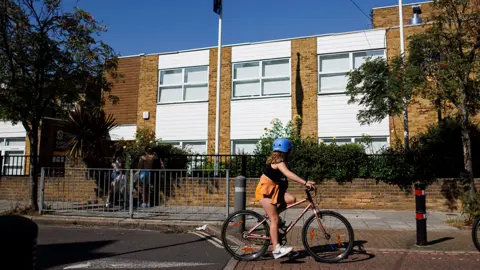Raac schools list of buildings with unsafe concrete in England
 EPA
EPAThe government has published an updated list of 234 schools and colleges in England it says have reinforced autoclaved aerated concrete (Raac).
All the schools, about 1% of the total in the country, have returned to face-to face learning.
However, many children are still being taught in marquees, portable classrooms, or off-site.
Where specialist classrooms like science labs have been affected, nearby schools may share facilities.
The total of affected schools has risen by three from the previous list.
The government has confirmed that 119 will have one or more buildings rebuilt or refurbished through the School Rebuilding Programme, and 110 will receive grant funding to remove it.
'Mitigation is the right approach'
Speaking to the Education Select Committee, Education Secretary Gillian Keegan said all schools suspected to have Raac have now responded to a Department for Education (DfE) questionnaire.
Where it is safe to do so, the DfE is trying to keep existing school buildings open with mitigation measures, such as propping up ceilings with wooden beams.
"We've got about 110 schools where we think mitigation is the right approach rather than temporary buildings," said Permanent Secretary Susan Acland-Hood.
Raac is a lightweight material that was used mostly in flat roofing, but also in floors and walls, between the 1950s and 1990s. It is a cheaper alternative to standard concrete and has a lifespan of about 30 years.
In June, the National Audit Office reported that years of insufficient funding had increased the risk of a building collapse.

Have you been affected by the issues raised in this story? Get in touch.
- Email [email protected]
- WhatsApp: +44 7756 165803
- Tweet: @BBC_HaveYourSay
- Upload your pictures or video
- Please read our terms & conditions and privacy policy

Last summer, a Raac panel that would have been classed as "non-critical" collapsed at a school in England - leading to the final decision to take action and a scramble ahead of the start of term.
Earlier this year, National Association of Head Teachers general secretary Paul Whiteman said the disruption for more pupils, parents and staff members was "a real concern".
Members had reported the DfE's initial response had been "mostly good", he said, but many were still waiting for temporary classrooms to be put in place, with some expecting to wait "more than six weeks".
The Scottish government is aware of 39 schools with Raac.
Five schools in Wales are affected.
Surveys checking for the concrete in Northern Ireland have so far found it in one Belfast primary school.
Note all settings with confirmed Raac at 8 February 2024 as published on the government website.
